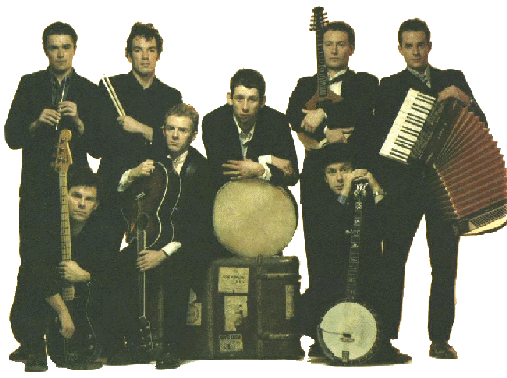Menu
U2, Globalization, and the Identity Trade
- Introduction
- Modern Irish Nationalism
- Problems with Irish Identity
- Folk/Traditional Music
- U2
- Origin
- Pop/Rock Authenticity
- U2's Style and Authenticity
- "Early Period"
- Pop Periphery and the Global Bubble
- U2's Identity Trade
- U2 vs The Pogues
- Summary and Conclusion
- Bibliography
U2 vs The Pogues: The Pogues' Style and Authenticity
U2’s lack of Irish identity becomes quite clear when one compares the Dublin rockers to the London-based Anglo-Irish folk-punk known as The Pogues (pictured below). The Pogues formed in 1982 in London, and its members are first and second generation Irish emigrants and thus members of the British diaspora. The fact that the The Pogues took a recording “hiatus” from 1993 to 2003 might be interpreted in several ways: a result of their inability to appeal to the global market as U2 did; a result of U2’s overshadowing of other “Irish” artists; simple apathy or some other band-related matter. Regardless, on the surface, the band openly identifies itself with Irish traditional culture in that “pogue” is the Gaelic word for “kiss.” As language functions as one of the important elements of Irish traditional culture, the Celtic name of this punk band alone could make them more “Irish” than the ambiguously named U2. Another way in which The Pogues’ music expresses Irish nationalism appears through many references to Ireland’s esteemed and internationally famous literary tradition. For example, in the song “Streams of Whiskey,” the line “I dreamt I met with Behan” directly mentions Brendan Behan, and the chorus includes the lines, “I am going/Where streams of whiskey are flowing,” a phrase alluding to Flann O’Brian’s An béal bocht, or The Poor Mouth. Aside from Behan and O’Brian, the band makes reference to other major Irish writers of the Twentieth century such as Samuel Beckett, Christy Brown, James Joyce, and Sean O’Casey (see Moran 2007 for discussion of The Pogues and Irish nationalism).
Returning once more to the theory of authenticity, The Pogues’ instrumentation also classifies them as a more authentic Irish band then U2. U2 rarely, if ever, incorporated new or traditional Irish instruments aside from those of the pop/rock archetype: lead vocals; guitar; bass guitar; drum set. In fact, as evidenced by their most recent songs like “Elevation” from All That You, the band has experimented more with electronic voices and studio effects than with actual instruments. Therefore, the music of U2 has been logically compared to other pop/rock acts because neither their form, style, or timbre differed from other archetypal pop bands. The Pogues, however, “sounded like no one else at the time,” because the blending of punk and traditional musical genres was a relatively novel idea when they first began recording in 1982. Moreover, the Pogues’ instrumentation blended elements of Irish folk and rock music in that they used electric guitars, bass, and rock percussion alongside mandolin, banjo, tin whistle, and acoustic guitar—the banjo, mandolin, and acoustic guitar are more general folk instruments that were incorporated into Irish folk music because of American influence.
